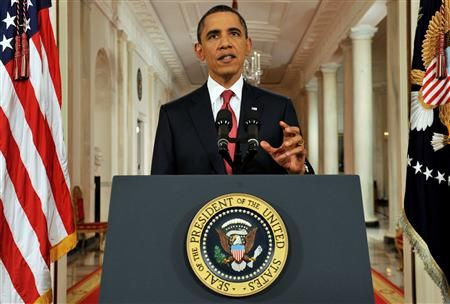Do Democrats and Republicans Worry More about Election and Less About Debt?

President Barack Obama's Monday night address to the nation voiced the gravity of situation and the urgency to reach a "fair compromise" on the ongoing debt talk. "Defaulting on our obligations is a reckless and irresponsible outcome to this debate. ...We would risk sparking a deep economic crisis - one caused almost entirely by Washington," Obama said.
While the U.S. treasury department says failure to raise the debt ceiling before the projected default date of Aug. 2 would lead to "catastrophic economic consequences," Republicans are busy finding expert advice which says U.S.'s lack of plans to tackle debt will result only in a downgraded U.S rating.
"More than two years after the beginning of the recent crisis, U.S. policy makers have still not agreed on how to reverse recent fiscal deterioration or address longer-term fiscal pressures," GOP quotes Standard & Poor's credit analyst Nikola G. Swann. "He (Swann) said the rating agency puts the chance of a U.S. downgrade within two years at least one-in-three," GOP quotes Matt Jarzemsky, of The Wall Street Journal.
Though U.S. government defaulting on its legal obligations is "an unprecedented event in American history," debt limit raises have happened as many as 78 times, starting 1960.
"Congress has acted 78 separate times to permanently raise, temporarily extend, or revise the definition of the debt limit - 49 times under Republican presidents and 29 times under Democratic presidents," says the U.S. treasury department.
Statistics on earlier debt limit raises, according to the chart displayed by Senator Jeanne Shaheen, shows that George W. Bush raised the debt ceiling seven times for a total increase of 90 percent, one among the highest percentage increase in debt, by any U.S. Presidents, so far. Yet another Republican Reagan raised the debt ceiling 18 times for a total increase of 199 percent, which is the highest ever percentage increase in U.S. history.
The chart also says President Obama has raised the debt ceiling three times for a total increase of 26 percent, one among the lowest percentage increases so far.
The Republican presidents have raised the debt ceiling by a total of 414 percent while the Democrats' total percentage increase is 152 percent.
If you go by the statistics, Republicans' clamor demanding a plan to rein in the federal debt instead of reaching a conclusion over raising the debt ceiling sounds more of a gimmick to put Obama in an awkward situation and deny him a second term.
At the same time Obama and the Democrats vehemently oppose a short-term extension of the debt ceiling. "It would be irresponsible to put our country and economy at risk again in just a few short months with another battle over raising the debt ceiling," the White House said in a statement shortly after Obama met with congressional leaders on Saturday.
If the current crisis is going to be out of control, why is Obama pushing for a longer term increase, given that Republicans are not showing any signs of agreement?
Instead of addressing the debt talks as "reckless and irresponsible" Obama should have taken the onus and abide by whatever has been agreed upon by the Republicans so as to avert an immediate disaster to a country which is recovering from the consequences of the recent recession.
But he chose to be adamant on his stand for a long-term debt raise to avoid a politically trying vote before his November 2012 re-election bid. And the Republicans foresee a handsome opportunity in pushing Obama to do just that.
The U.S. borrowing limit, currently at $14.29 trillion, was reached on May 16 this year and the time till Aug. 2 is the grace period for extraordinary measures. Getting things done sounds a better option right now than playing the 'blamestorming game'.
© Copyright IBTimes 2024. All rights reserved.






















